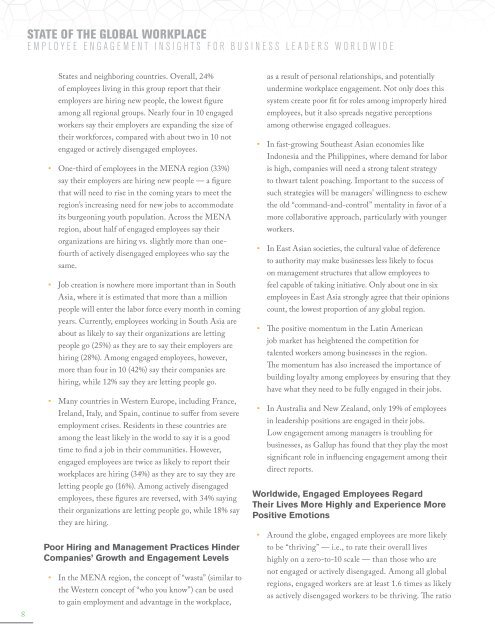GlobalWorkplaceReport_2013
GlobalWorkplaceReport_2013
GlobalWorkplaceReport_2013
You also want an ePaper? Increase the reach of your titles
YUMPU automatically turns print PDFs into web optimized ePapers that Google loves.
State of the Global Workplace<br />
Employee Engagement Insights for Business Leaders Worldwide<br />
States and neighboring countries. Overall, 24%<br />
of employees living in this group report that their<br />
employers are hiring new people, the lowest figure<br />
among all regional groups. Nearly four in 10 engaged<br />
workers say their employers are expanding the size of<br />
their workforces, compared with about two in 10 not<br />
engaged or actively disengaged employees.<br />
••<br />
One-third of employees in the MENA region (33%)<br />
say their employers are hiring new people — a figure<br />
that will need to rise in the coming years to meet the<br />
region’s increasing need for new jobs to accommodate<br />
its burgeoning youth population. Across the MENA<br />
region, about half of engaged employees say their<br />
organizations are hiring vs. slightly more than onefourth<br />
of actively disengaged employees who say the<br />
same.<br />
••<br />
Job creation is nowhere more important than in South<br />
Asia, where it is estimated that more than a million<br />
people will enter the labor force every month in coming<br />
years. Currently, employees working in South Asia are<br />
about as likely to say their organizations are letting<br />
people go (25%) as they are to say their employers are<br />
hiring (28%). Among engaged employees, however,<br />
more than four in 10 (42%) say their companies are<br />
hiring, while 12% say they are letting people go.<br />
••<br />
Many countries in Western Europe, including France,<br />
Ireland, Italy, and Spain, continue to suffer from severe<br />
employment crises. Residents in these countries are<br />
among the least likely in the world to say it is a good<br />
time to find a job in their communities. However,<br />
engaged employees are twice as likely to report their<br />
workplaces are hiring (34%) as they are to say they are<br />
letting people go (16%). Among actively disengaged<br />
employees, these figures are reversed, with 34% saying<br />
their organizations are letting people go, while 18% say<br />
they are hiring.<br />
Poor Hiring and Management Practices Hinder<br />
Companies’ Growth and Engagement Levels<br />
••<br />
In the MENA region, the concept of “wasta” (similar to<br />
the Western concept of “who you know”) can be used<br />
to gain employment and advantage in the workplace,<br />
8 <br />
as a result of personal relationships, and potentially<br />
undermine workplace engagement. Not only does this<br />
system create poor fit for roles among improperly hired<br />
employees, but it also spreads negative perceptions<br />
among otherwise engaged colleagues.<br />
••<br />
In fast-growing Southeast Asian economies like<br />
Indonesia and the Philippines, where demand for labor<br />
is high, companies will need a strong talent strategy<br />
to thwart talent poaching. Important to the success of<br />
such strategies will be managers’ willingness to eschew<br />
the old “command-and-control” mentality in favor of a<br />
more collaborative approach, particularly with younger<br />
workers.<br />
••<br />
In East Asian societies, the cultural value of deference<br />
to authority may make businesses less likely to focus<br />
on management structures that allow employees to<br />
feel capable of taking initiative. Only about one in six<br />
employees in East Asia strongly agree that their opinions<br />
count, the lowest proportion of any global region.<br />
••<br />
The positive momentum in the Latin American<br />
job market has heightened the competition for<br />
talented workers among businesses in the region.<br />
The momentum has also increased the importance of<br />
building loyalty among employees by ensuring that they<br />
have what they need to be fully engaged in their jobs.<br />
••<br />
In Australia and New Zealand, only 19% of employees<br />
in leadership positions are engaged in their jobs.<br />
Low engagement among managers is troubling for<br />
businesses, as Gallup has found that they play the most<br />
significant role in influencing engagement among their<br />
direct reports.<br />
Worldwide, Engaged Employees Regard<br />
Their Lives More Highly and Experience More<br />
Positive Emotions<br />
••<br />
Around the globe, engaged employees are more likely<br />
to be “thriving” — i.e., to rate their overall lives<br />
highly on a zero-to-10 scale — than those who are<br />
not engaged or actively disengaged. Among all global<br />
regions, engaged workers are at least 1.6 times as likely<br />
as actively disengaged workers to be thriving. The ratio


